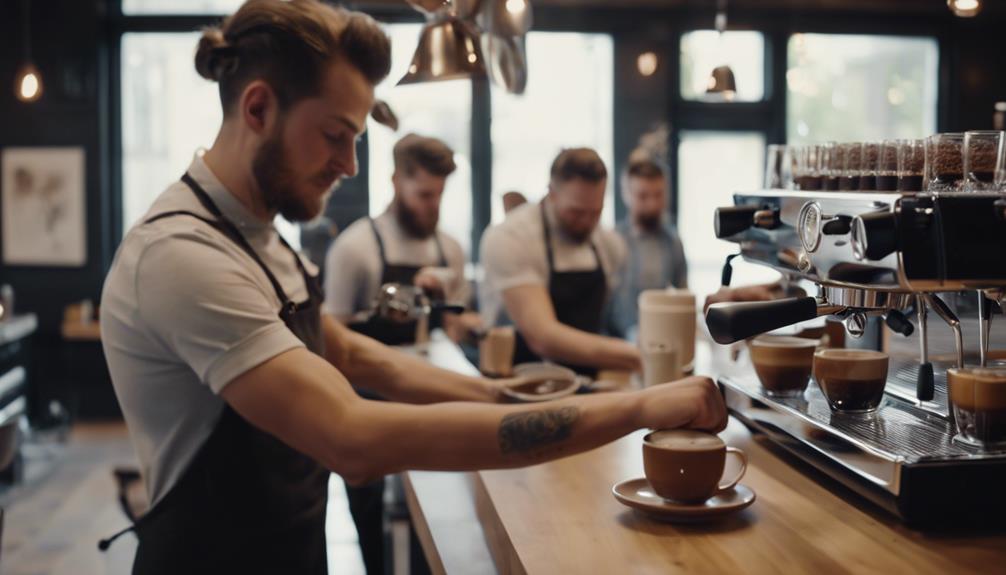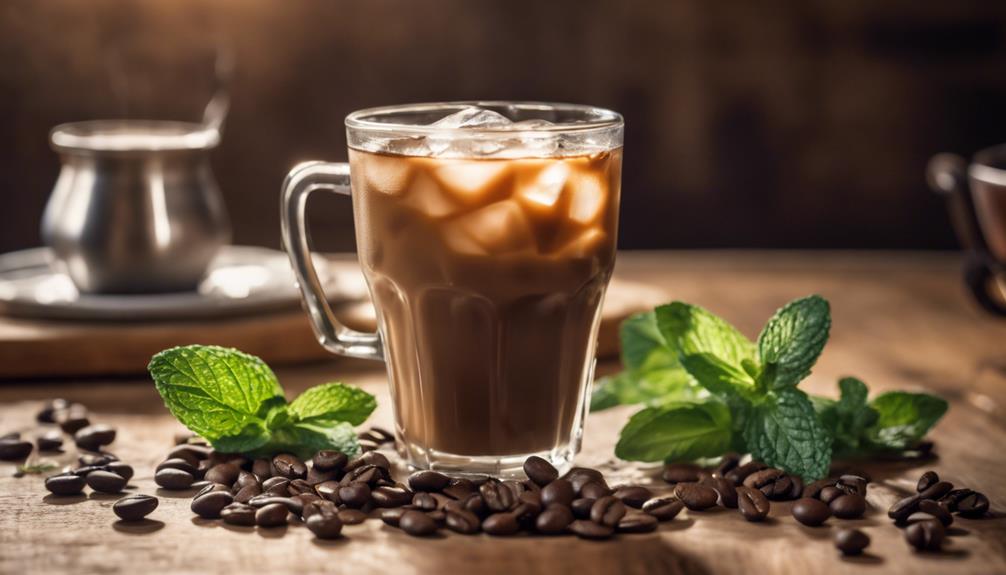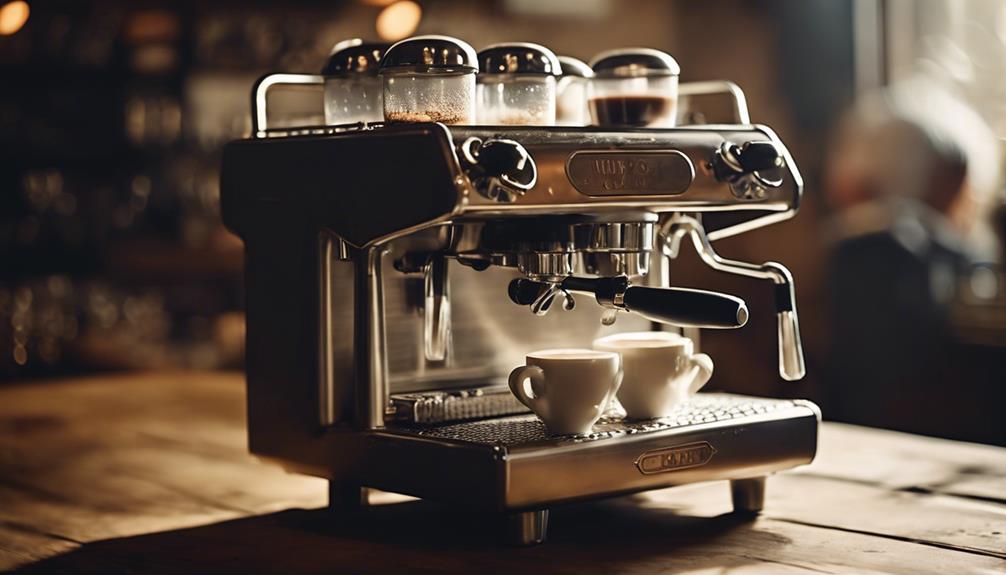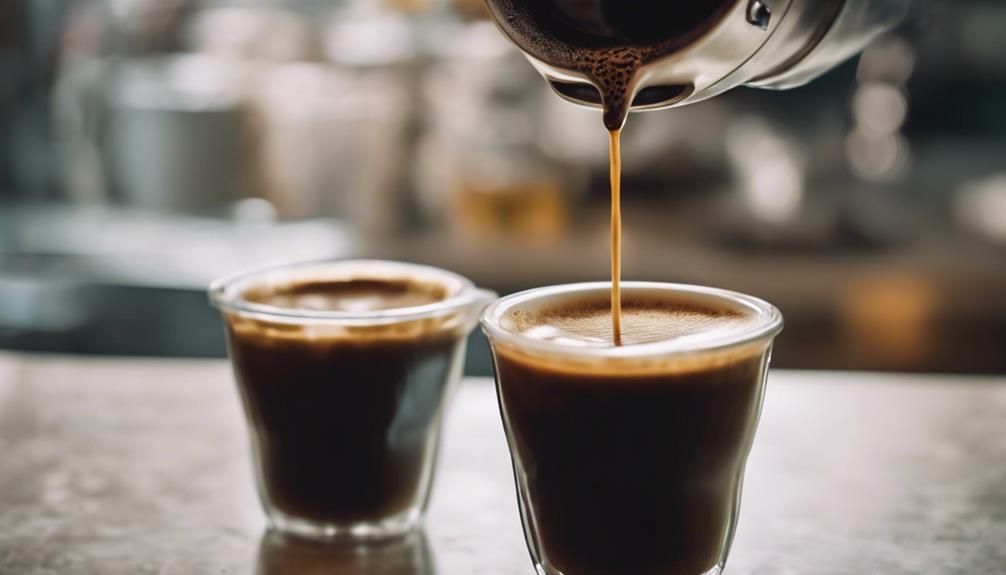When evaluating espresso training expenses, take into account variables such as course length, location, and expertise levels. Basic courses typically start at $100, while more advanced programs can go up to $1000. Prices can fluctuate based on these aspects, allowing for customization depending on your preferences and budget. Elements like hands-on training, equipment use, and certification also impact the total cost. By exploring various options, you can discover a training course that meets your requirements while offering hands-on practice and skill enhancement. Having a grasp on these cost factors will aid you in making a well-informed decision for your espresso training requirements.
Key Takeaways
- Espresso training costs vary from $100 for basic courses to $1000 for advanced programs.
- Factors like duration, location, and expertise level influence the cost of espresso training.
- Additional attendee discounts available for group bookings, reducing overall training expenses.
- Inclusions in training costs may cover lunches, equipment, and internationally recognized certificates.
- Practical hands-on practice is essential for developing proficient barista skills and gaining confidence.
Pricing Options for Espresso Training
Explore various pricing options for espresso training to find the best fit for your budget and learning needs. You can opt for a thorough 1-day course that includes lunches for $850. This course offers an in-depth exploration into espresso training, ensuring you gain valuable skills and knowledge.
If you're looking for certification, consider the Barista One course by the world champion barista, Matt Perger. This course consists of over 40 videos and 50+ lessons, although the exact pricing is undisclosed.
For those preferring online courses, Barista Hustle provides options like the Advanced Coffee Making Course Certification for $149.
If you prefer hands-on professional training, private barista training is available. A two-day course, with six hours per day, costs $1,080. Alternatively, you can opt for private training at a Ventura roasting facility and cafe for $250 per person.
With these different pricing options, you can select the training that best suits your preferences and budget.
Cost Breakdown of Barista Training
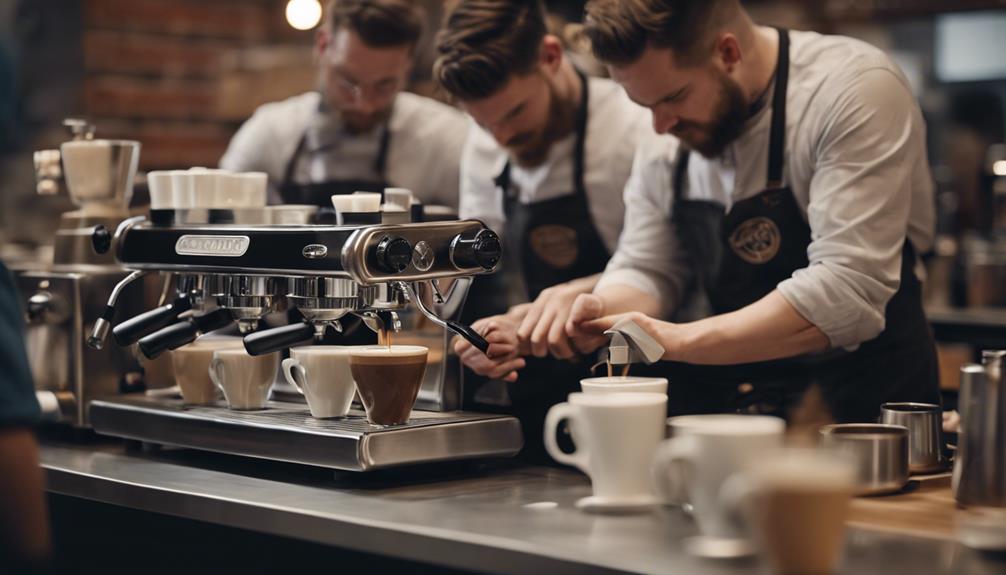
When examining the cost breakdown of barista training, it's crucial to factor in:
- Training program costs
- Equipment expenses
- Any additional fees that may apply
These components contribute to the overall investment you'll make in developing your barista skills.
Understanding the breakdown of costs will help you budget effectively for your barista training experience.
Training Program Costs
The breakdown of barista training costs reveals a range of prices, from $850 for a 1-day course to $1,080 for a 2-day course, with potential discounts for group bookings or additional attendees. Gift certificates for espresso training courses are available, ideal for coffee enthusiasts, typically valid for one year. Online courses like the Barista One certification offer lifetime access for $149. Private barista training and espresso packages are also options at varying costs.
| Training Program | Duration | Cost |
|---|---|---|
| 1-Day Course | 1 day | $850 |
| 2-Day Course | 2 days | $1,080 |
| Online Barista One Course | Lifetime | $149 |
| Private Training | Custom | Varies |
| Espresso Packages | Custom | Varies |
Equipment Expenses
Equipment expenses for barista training programs typically encompass the cost of utilizing essential tools like espresso machines, grinders, and milk frothers. These expenses are often included in the overall cost of the training program and may cover the use of state-of-the-art equipment during the workshop.
Depending on the duration and depth of the training, prices for espresso training can range from $850 to $1,080. In some cases, the cost of training may also include lunch or other amenities provided during the workshop to enhance the learning experience.
It's important to take into account these equipment expenses when budgeting for barista training, as they play a significant role in hands-on learning and skill development. Understanding the breakdown of costs, including equipment expenses, can help you make an informed decision when choosing a training program that aligns with your goals and budget.
Additional Fees
Consider factoring in additional fees for amenities like lunch or discounts for group bookings when budgeting for barista training programs. Private professional barista training may offer a thorough 1-day session at around $850, with the possibility of additional costs for lunch during the training. For more extensive courses, such as a two-day private program with tailored instruction and a detailed workbook included, the cost could be approximately $1,080. Group bookings present an opportunity for reduced costs, as discounts are often available for multiple participants. This makes it a more affordable option for businesses looking to train their staff or individuals wanting to join with others. These discounts can make the training session more accessible and cost-effective, allowing for a thorough learning experience without breaking the bank.
| Training Type | Cost Range | Additional Fees |
|---|---|---|
| 1-Day Thorough Session | $850 | Lunch may cost extra |
| 2-Day Private Training | $1,080 | Workbook and lunch included |
| Group Bookings | Varies | Discounts available |
Factors Affecting Training Costs
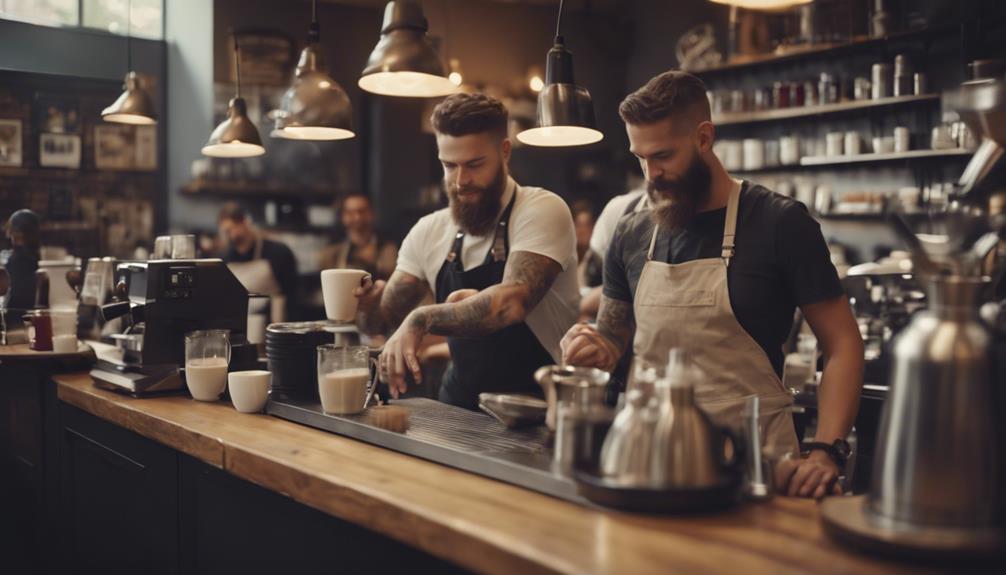
Factors influencing the cost of espresso training include the duration, location, and level of expertise provided.
The duration of the training program can affect the overall cost, with basic barista courses often starting around $100, while more advanced and thorough programs ranging from $500 to $1000.
The location of the training, whether it's at a local cafe or a specialized training center, can also impact the pricing.
The level of expertise offered, such as beginner, intermediate, or professional barista training, may come at different price points.
Additionally, factors like hands-on practice, equipment usage, and certification can contribute to the overall cost.
Private sessions or personalized training may cost more than group classes due to the one-on-one attention provided.
Moreover, additional expenses like travel, accommodation, and materials can add to the total cost of espresso training.
Additional Attendee Discount Details
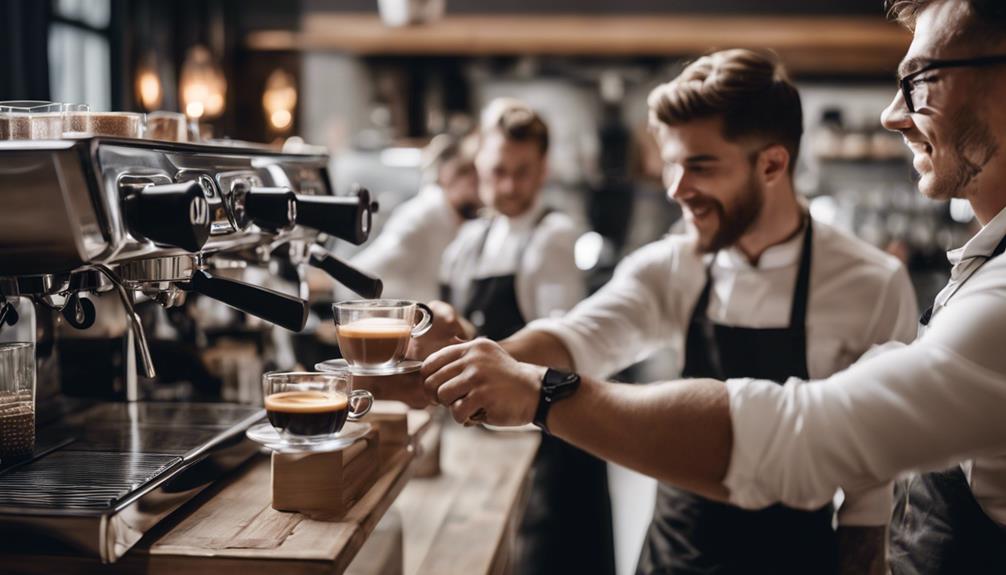
When multiple individuals enroll in the espresso training course, they can benefit from an additional attendee discount.
Here are some details regarding the reduced cost for extra participants:
- The cost for additional attendees is typically lower than the standard course fee.
- Discounts are provided for multiple individuals attending the course together.
- Savings can be achieved when more than one person enrolls in the espresso training program.
- The additional attendee discount offers a great opportunity to save on the overall training cost.
Inclusions in Espresso Training Cost
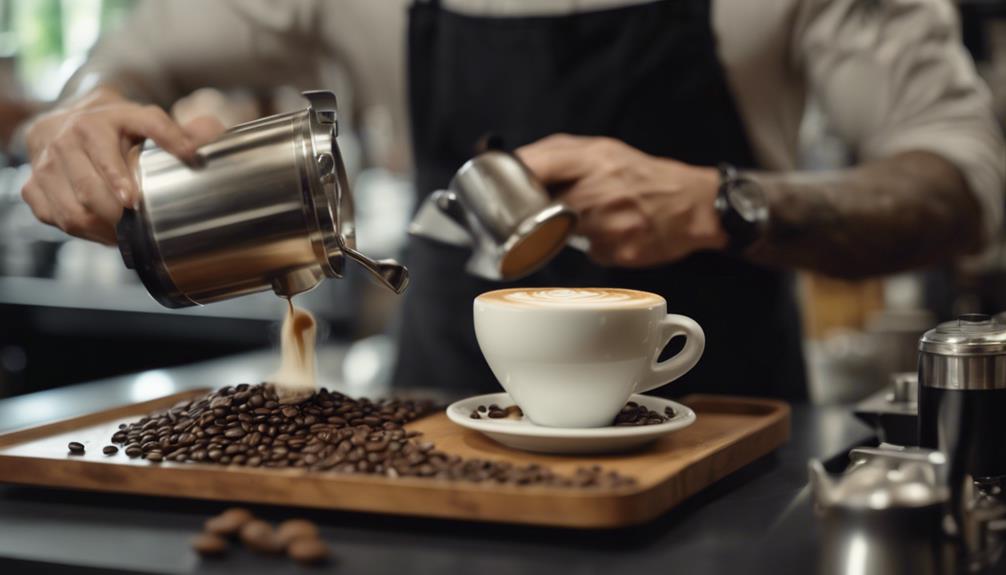
When analyzing the espresso training cost, it's important to understand what's included in the program. For $850, participants not only receive thorough training but also enjoy lunches during the course. Upon completion, attendees are awarded an internationally recognized certificate, validating their newly acquired barista skills.
The training covers a range of essential aspects, including using espresso machines, mastering milk preparation techniques, and understanding equipment maintenance. The focus is on providing hands-on experience and practical knowledge, allowing participants to gain confidence in creating espresso-based drinks.
This training is designed to benefit both home baristas looking to enhance their skills and professionals seeking to refine their craft. By offering a well-rounded curriculum and emphasizing practical learning, the program equips individuals with the expertise needed to excel in the art of making espresso beverages.
Personalized Attention in Small Classes
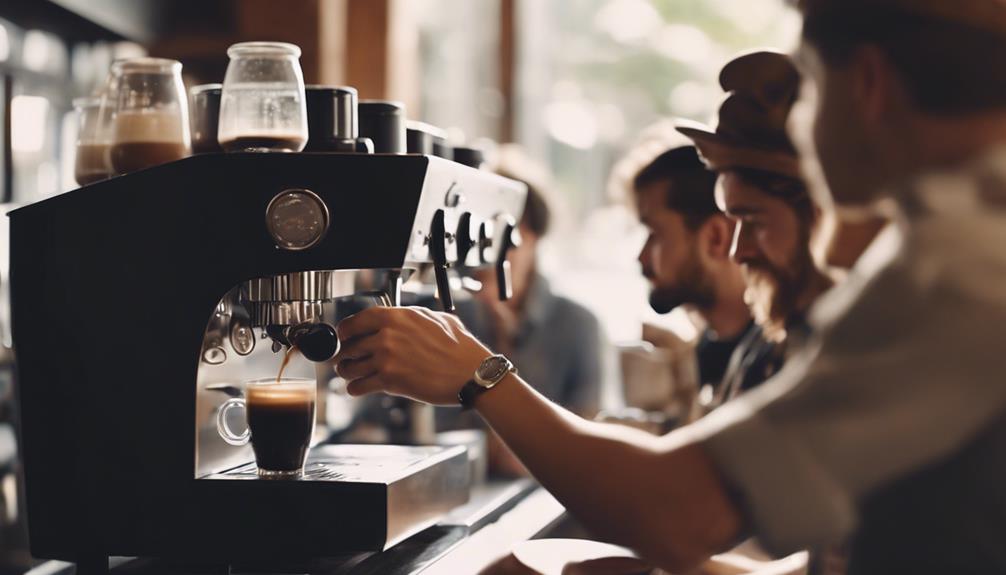
Personalized attention in small classes guarantees that participants receive focused and tailored instruction in essential barista skills. When considering espresso training, opting for small classes can offer various benefits, such as:
- Individualized Guidance: In small classes, instructors can cater to the specific needs and skill levels of each participant, ensuring a personalized learning experience.
- Interactive Learning Environment: With fewer students, there's more opportunity for active participation, discussions, and hands-on practice during the training sessions.
- Increased Feedback: Participants in small classes receive more feedback and one-on-one interaction with instructors, facilitating quicker skill development and improvement.
- Thorough Focus on Skills: Small classes allow for an in-depth exploration of essential barista skills without distractions, offering a more complete understanding of the craft.
These advantages make small classes with personalized attention an attractive option for those seeking quality barista training.
Value of Hands-On Practice
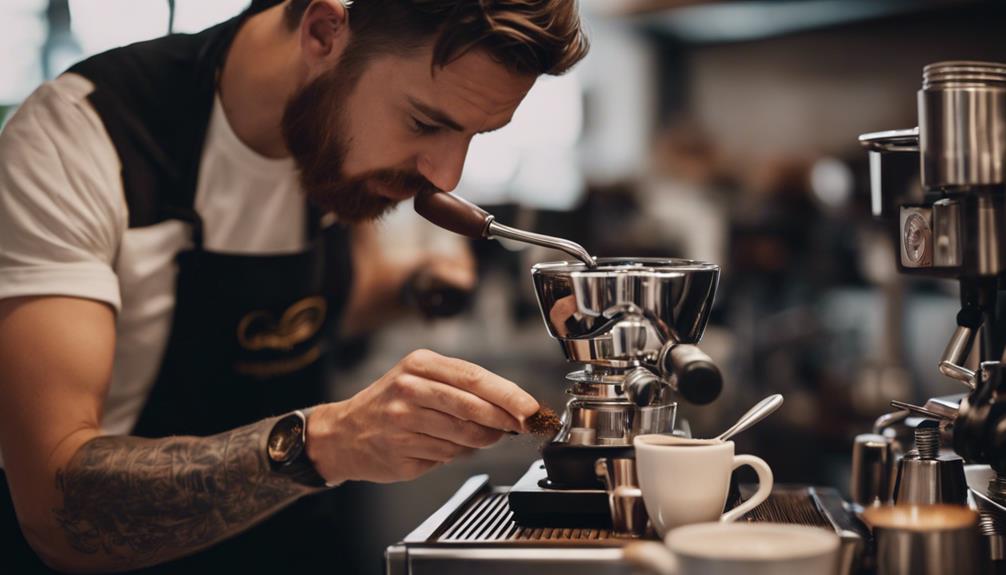
Hands-on practice is essential in developing your barista skills as it allows you to apply theoretical knowledge in a practical setting.
By honing your skills through practice, you can enhance your technique, consistency, and efficiency behind the espresso machine.
The value of hands-on practice lies in its ability to transform theoretical understanding into tangible abilities, setting the foundation for becoming a proficient barista.
Importance of Practice
For baristas aiming to perfect their craft, nothing beats the value of hands-on practice in mastering the art of espresso preparation. Here are some key reasons why practice is essential:
- Developing Skills: Practice allows you to hone your technique in espresso preparation, milk steaming, and latte art.
- Enhancing Knowledge: Hands-on experience provides a deeper understanding of the intricacies involved in making a perfect espresso.
- Building Confidence: Regular practice boosts your confidence in handling espresso machines and creating delicious beverages.
- Achieving Recognition: By investing time in practice, you increase your chances of obtaining an internationally recognized certificate in espresso training.
Engaging in practical experience not only refines your abilities but also solidifies your grasp on the nuances of coffee crafting.
With dedication to practice, you can elevate your barista skills to new heights and stand out in the competitive world of coffee preparation.
Skill Development Benefits
Mastering the art of espresso preparation through practice provides invaluable skill development benefits. Hands-on practice in espresso training is essential for honing the necessary skills and gaining confidence in creating quality espresso drinks.
Investing in espresso training not only enhances your abilities but also opens doors to improved career opportunities within the coffee industry. Upon completion of espresso training courses, participants receive an internationally recognized certificate, adding credibility to their expertise.
The value of hands-on espresso training lies in gaining practical experience with various equipment like espresso machines, milk frothers, and learning about equipment maintenance. These experiences not only improve your espresso-making skills but also provide a solid foundation for advancing in your career.
Comprehensive Workbook Benefits
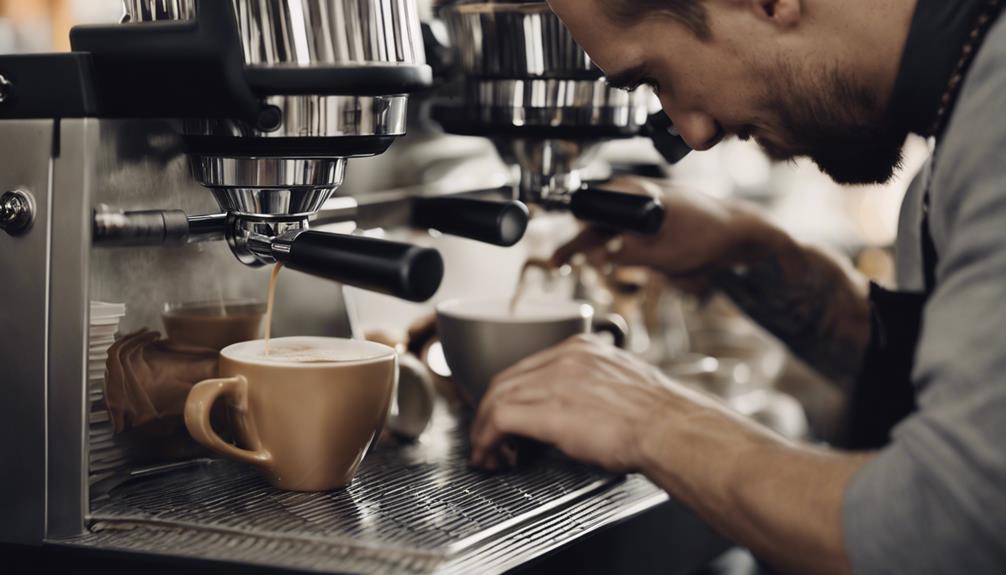
The thorough workbook provided as part of the espresso training offers participants in-depth guidance on various aspects of coffee preparation and mastery. This all-encompassing resource covers a wide range of topics, including:
- The theory of coffee: Understanding the origins, processing methods, and flavor profiles of different coffee beans.
- Brewed coffee mastery: Learning the art of brewing the perfect cup of coffee using various methods.
- Espresso preparation: Mastering the techniques required to pull a balanced shot of espresso.
- Milk texturing and latte art: Perfecting the art of steaming milk to create creamy textures and intricate designs for beverages.
With detailed sections on drink builds, workflow optimization, cleaning procedures, and troubleshooting tips, the workbook equips participants with the knowledge and skills needed to excel in the world of specialty coffee.
Cost Comparison With Similar Programs
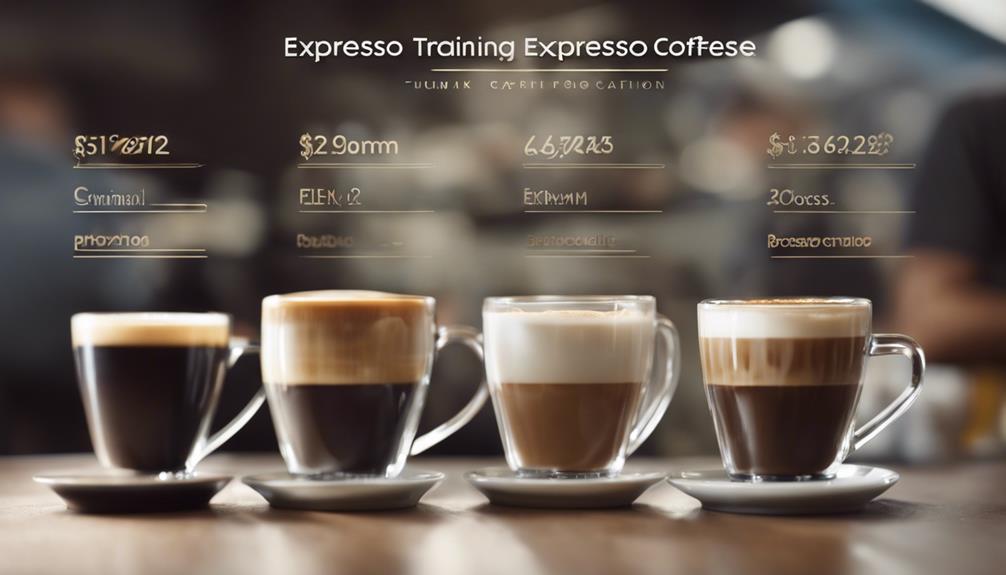
When evaluating the costs of espresso training programs, it's important to assess the value provided in relation to the price you pay.
The Barista One course, priced at $850, offers a thorough 1-day training experience.
Alternatively, the Basic Barista Course in Houston provides hands-on training sessions and a Basic Barista Certificate, with costs undisclosed.
For a more detailed option, the 2-Day Barista Training Class offers practical training, lunch, and an internationally recognized certificate at a discounted rate.
If you prefer personalized attention, private professional barista training for individuals costs $1,080 for a two-day course covering various coffee preparation aspects.
Additionally, group bookings can be a cost-effective choice for multiple participants, potentially reducing overall expenses while ensuring quality training.
Before making a decision, consider the benefits each program offers and how they align with your goals and budget.
Frequently Asked Questions
How Much Does It Cost to Learn to Be a Barista?
To become a barista, costs vary depending on the training program. Courses can range from $850 for a 1-day session to $1,080 for a 2-day course. Discounts may apply for group bookings.
Online options include a $149 Advanced Coffee Making Course Certification or a $99 Milk Science Latte Art Course Certification.
Private sessions tailored to your needs may cost around $250. Consider gift certificates for the coffee lover in your life.
What Is the Rate for Barista Training?
To get the scoop on barista training rates, consider various options. From basic courses costing between $850 to $1,080 for intensive learning to online classes like Barista One at $149, there are choices for every preference.
Private sessions could set you back $1,080, with discounts for group bookings. Barista Hustle offers affordable options starting at $149 for courses and memberships from $15 monthly.
Explore and find what suits you best.
Is It Worth Doing a Barista Course?
It's advisable to explore a barista course as it can enhance your skills, boost espresso-making abilities, and create opportunities for career growth.
The training offers hands-on experience, expert guidance, and a certification upon completion.
You'll gain practical knowledge in operating espresso machines, milk preparation, and equipment maintenance.
Investing in espresso training can increase your confidence in important barista skills and provide valuable experience in the coffee industry.
How Much Barista Course?
When considering barista training, weigh the course's content, duration, and cost against your goals.
The Barista One course offers a thorough 1-day session at $850, while the Advanced Coffee Making Course Certification provides further training opportunities for $149.
Barista Hustle's Basic Barista Course caters to coffee enthusiasts, aspiring baristas, and cafe staff.
Private professional training, priced at $1,080, offers tailored two-day courses for specific skill development.
Consider these factors to determine the best fit for your needs.
Is Espresso Training Worth the Cost Compared to Buying Espresso in the Philippines?
When considering espresso training, it’s important to weigh the benefits against the espresso prices in philippines. While buying espresso may seem convenient, investing in training can elevate your coffee-making skills and save money in the long run. Mastering the art of brewing espresso at home can be a rewarding and cost-effective choice.
Conclusion
To sum up, while the cost of espresso training may seem steep at first glance, the value of the experience far outweighs the price. Investing in proper training can lead to increased skills, confidence, and job opportunities in the world of coffee.
So, don't let the numbers deter you from pursuing your passion for espresso. The benefits of quality training are well worth the cost in the long run.
